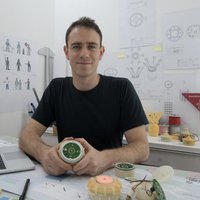Computer & electronics hardware
Bill Liu
His flexible components could change the way people use electronics.

Europe
Chris Natt
His reactive simulations of anti-personnel mines afford greater safety to those responsible for their elimination and allow them to better identify the risks involved

China
Yunji Chen
Accelerate the era of intelligence

India
Kshitij Marwah
Virtual reality (VR) camera to create and share high resolution VR/holographic content

China
Yichen Shen
Developing a nano-optical AI chip that can accelerate the revolution of computational ecology
